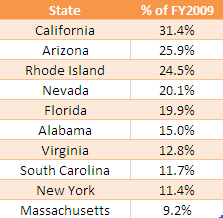Bernie Madoff Counts the Stimulus
Cafe Hayek has a series of articles here and here on the absurd numerical games going on to pump up the stimulus numbers (which I also offered example of here, where pay increases were considered a "job saved").
For example:
Up to one-fourth of the 110,000 jobs reported as saved by federal stimulus money in California probably never were in danger, a Bee review has found.
California State University officials reported late last week that they saved more jobs with stimulus money than the number of jobs saved in Texas "“ and in 44 other states.
In a required state report to the federal government, the university system said the $268.5 million it received in stimulus funding through October allowed it to retain 26,156 employees.
That total represents more than half of CSU's statewide work force. However, university officials confirmed Thursday that half their workers were not going to be laid off without the stimulus dollars.
"This is not really a real number of people," CSU spokeswoman Clara Potes-Fellow said. "It's like a budget number."
Also here:
While Massachusetts recipients of federal stimulus money collectively report 12,374 jobs saved or created, a Globe review shows that number is wildly exaggerated. Organizations that received stimulus money miscounted jobs, filed erroneous figures, or claimed jobs for work that has not yet started.
The Globe's finding is based on the federal government's just-released accounts of stimulus spending at the end of October. It lists the nearly $4 billion in stimulus awards made to an array of Massachusetts government agencies, universities, hospitals, private businesses, and nonprofit organizations, and notes how many jobs each created or saved.
But in interviews with recipients, the Globe found that several openly acknowledged creating far fewer jobs than they have been credited for.
One of the largest reported jobs figures comes from Bridgewater State College, which is listed as using $77,181 in stimulus money for 160 full-time work-study jobs for students. But Bridgewater State spokesman Bryan Baldwin said the college made a mistake and the actual number of new jobs was "almost nothing.'' Bridgewater has submitted a correction, but it is not yet reflected in the report.
It is becoming clearer and clearer that the vast majority of "jobs saved" were in government, and in effect the stimulus merely had the effect of bailing out state governments that were able to use stimulus money to put off their budget reckonings.

